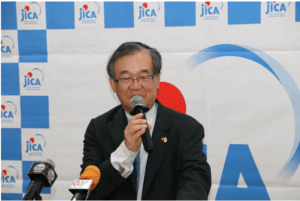By Kizito CUDJOE
Ghana and Japan have reinforced academic cooperation through the 3rd JICA Chair programme, jointly hosted by the University of Ghana (UG) and Japan International Cooperation Agency (JICA), with a focus on the role of artificial intelligence in Japanese media.
Speaking at the event, Japanese Ambassador to Ghana Hiroshi Yoshimoto noted that the relationship between the two countries is anchored on mutual respect and shared aspirations, with education being a key area of cooperation.
“Over the years, Japanese institutions and the government of Japan have supported capacity-building programmes in Ghana through scholarships and academic exchanges,” he said.
He added that Japan continues to welcome Ghanaian students and researchers to its universities through programmes such as the MEXT scholarship, JDS for public officials and the ABE Initiative.
“All these programmes are tailored in a way that helps to shape the future of Ghana’s young generation.”

Ambassador Yoshimoto also highlighted the long-standing engagement between the University of Tokyo and UG, which offers students of both institutions opportunities to discuss the future of education.
He encouraged more of such collaborations, “as they provide valuable opportunities for academic exchange, mutual learning and strengthening ties between Japan and Ghana”.
He also stressed the Japanese philosophy of Kaizen, which emphasises continuous improvement. Japanese-style education, he said, incorporates this philosophy by fostering moral values such as teamwork and a sense of responsibility – principles which are closely aligned with Kaizen.
“These values offer meaningful insights that can positively support and strengthen Ghana’s educational system.”
Touching on the lecture topic, From Ink to Intelligence: The Future of Japanese Journalism in the AI Era, he observed that journalism – one of the pillars of democracy – is at a fascinating crossroads.
He said AI technologies are rewriting the rules of news production: “While it is offering tools to enhance efficiency, it is also raising ethical concerns”.
Given this, he stressed the importance of keeping journalism focused on its core purpose of serving the public good amid the ongoing development of AI. “As we enter a new era wherein AI is reshaping everything around us, it has become important for us to strengthen collaboration among our researchers and institutions; whether in the areas of education, technology, agriculture, journalism or others.”
The Chief Representative of JICA Ghana, Suzuki Momoko, also speaking at the event said the special lecture forms part of ongoing collaboration under the JICA Chair programme in Ghana, “aimed at deepening our mutual understanding of Japan’s development experience and culture”.
“Through such exchanges, our relationship continues to grow stronger,” she added.
She also announced that the 9th Tokyo International Conference on African Development (TICAD9) will be held from August 20–22 in Yokohama, Japan.
“Since 1993, TICAD has been a major international conference led by the Japanese government in partnership with the United Nations, World Bank, and African Union, focusing on Africa’s development.”
She said African leaders and experts from across the continent and beyond will gather at TICAD to discuss sustainable development and cooperation. “We look forward to TICAD9 playing a significant role in further strengthening the ties between Japan and African countries, especially Ghana,” she stated.
The lecture, delivered by Executive Vice President-University of Tokyo, Prof. Hayashi Kaori, explored the trajectory of Japanese journalism – from its 19th-century origins in print culture to its current engagement with artificial intelligence.
She noted that despite Japan’s strong legacy in newspaper journalism, the industry now faces pressure to innovate while preserving editorial integrity.
Her abstract noted that media organisations are cautiously adopting AI for automation and content generation, amid concerns about ethics, accuracy and regulation. “Japan’s uniquely conservative and institution-driven media landscape shapes its response to technological change.”
By tracing this historical and cultural continuity, the lecture offered insights into how Japanese journalism is navigating the tension between tradition and transformation in the AI era.










